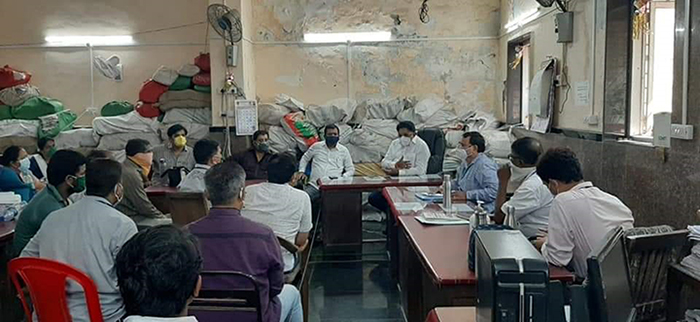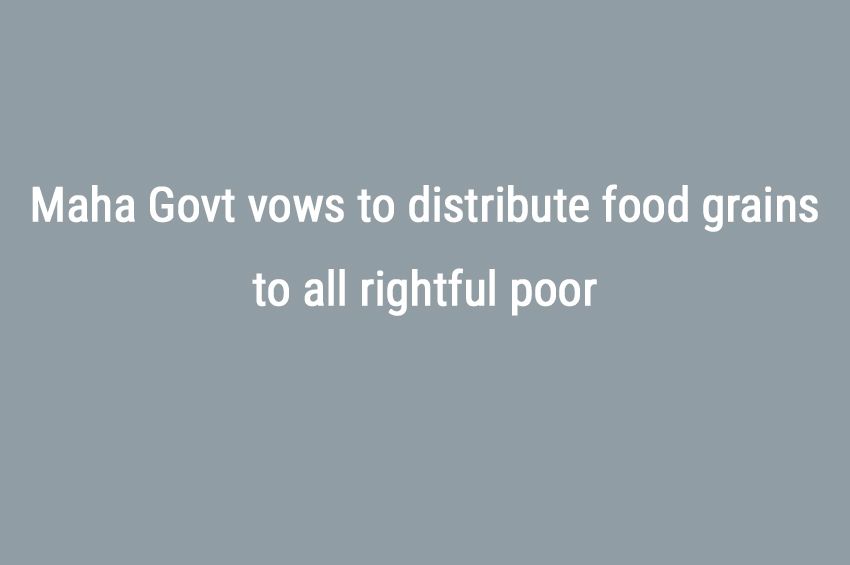Winning Bizness Desk
Mumbai. At a time when Covid-19 outbreak has forced Indian government to enforce nationwide lockdown and extending it frequently till situation comes under control, the questions of the survival of thousands of economically marginalized section of the society, who largely bank on cheaper food grains, have come into fore, prompting Maharashtra Government to mend its ways of Public Distribution System (PDS) and allot grains in most transparent manner to all poor people, even if they have not seeded their ration cards with Aadhar numbers. Thousands of folks living in slums, chawls in megacity Mumbai have been the most suffered class due to lockdown and a bowl of meal becoming most essential commodity for them as days of lockdown proceeding ahead day by day.
Meanwhile, the unfortunate instances of selling insufficient food grains to these needy people at rations shops in few parts of the city have added to their woes, forcing policy makers to chip in and assuring to distribute rightful quantity of food so that not a single person goes hungry.
After a social activist Floyd Miranda exposed that many ration distributors or shopkeepers in Andheri area were selling less food grains to the beneficiaries and displaying enough sale on government portal, local MLA from Shivsena Ramesh Latke came forward and warned the ration distributors to absolve themselves from any malpractices. He out-rightly echoed that when entire humanity facing never-before like ordeal and whole world bleeding, especially poor for survival, such complaints will not be tolerated.
Last week, Latke held a crucial joint meeting at Regional Rationing Office with Rationing Department Officers and Ration Shop owners in the presence of Ward Committee Chairman Mr Sunil Yadav, Vidhan Sabha Sanghatak Mr Pramod Sawant and Councillor Mr. Sandeep Naik to ensure equitable distribution of rations.
Speaking to Winning Bizness, Latke said that the issues were discussed at length and rationing shop owners were instructed to distribute rightful ration to all beneficiaries and to maintain proper records by issuing receipts to all eligible consumers.
He further said, “We also instructed distributors to introduce coupons on hourly basis to avoid longer period in queues, that will eventually help maintaining social distancing. The senior officers of the rationing department have swung into action and are ensuring that not a single needy man goes hungry.”
In the same time, Food and Civil Supply minister of Maharashtra Chhagan Bhujbal announced that food grains will be home delivered to those who possess saffron ration card (Kesari ration card) for the next two months and that too at subsidized rates. The saffron cardholders are families with an annual income of Rs 15,000 to Rs 1 lakh. Bhujbal also directed the officials to ensure that the delivery of food grains was done in a transparent manner even though the ration cards are not Aadhar card seeded. The minister further informed that saffron ration cards will now get 3 kilograms of wheat and 2 kilograms of rice per person every month at subsidized rates.
Miranda, who extensively analyzed the pattern of food grains distribution unleashed that though Union Government and Maharashtra Government have initiated generous schemes to deliver food grains such as pulses, rice, kerosene oil etc. at cheaper rates through ration shops, but its distribution at local level has been marred by several controversies and malpractices, nullifying the basic objectives of the initiative.
Pointing out his study, Miranda, the coordinator of Yuva Sena of Andheri Assembly Constituency, told Winning Bizness, “I studied the actual sale of food grains at the shop and same reported on government website for the month of March and April. I found that the beneficiaries who were sold only 4 kg, 5 kg or 2 Kg of wheat, rice and daal respectively, were reported to have bought 9 kg, 12 kg and 4 kg of food grains. I brought this matter to the notice of rationing officers at various levels so that everyone could get rations by paying attention to this problem.”
Miranda, however, lauded Maharashtra government’s initiatives and said, “Thackeray government has increased the number of meals under Shiv Bhojan Thali to 1.5 lakh. Earlier, the government was providing meals to one lakh people. Shiv Bhojan Thali scheme is a highly subsidized meal available for the poor and the needy and this scheme has come out to be a truly poor-friendly.”



